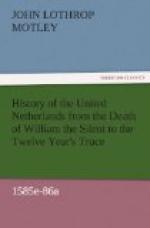The news from France happened soon to be very conclusive, and it then became difficult even for Falek to believe—after intelligence received of the accord between Henry III. and the Guises—that his Christian Majesty, would be inclined for a bite at the Netherlands. This duplicity on the part of so leading a personage furnishes a key to much of the apparent dilatoriness on the part of the English government: It has been seen that Elizabeth, up to the last moment, could not fairly comprehend the ineffable meanness of the French monarch. She told Ortel that she saw no reason to believe in that great Catholic conspiracy against herself and against all Protestantism which was so soon to be made public by the King’s edict of July, promulgated at the very instant of the arrival in England of the Netherland envoys. Then that dread fiat had gone forth, the most determined favourer of the French alliance could no longer admit its possibility, and Falck became the more open to that peculiar line of argument which Leicester had suggested with regard to one of the other deputies. “I will do my best,” wrote Walsingham, “to procure that Paul Buys and Falck shall receive underhand some reward.”
Besides Menin, Falck, and Buys, were Noel de Caron, an experienced diplomatist; the poet-soldier, Van der Does; heroic defender of Leyden; De Gryze, Hersolte, Francis Maalzoon, and three legal Frisians of pith and substance, Feitsma, Aisma, and Jongema; a dozen Dutchmen together— as muscular champions as ever little republic sent forth to wrestle with all comers in the slippery ring of diplomacy. For it was instinctively felt that here were conclusions to be tried with a nation of deep, solid thinkers, who were aware that a great crisis in the world’s history had occurred, and would put forth their most substantial men to deal with it: Burghley and Walsingham, the great Queen herself, were no feather-weights like the frivolous Henry III., and his minions. It was pity, however, that the discussions about to ensue presented from the outset rather the aspect of a hard hitting encounter of antagonists than that of a frank and friendly congress between two great parties whose interests were identical.
Since the death of William the Silent, there was no one individual in the Netherlands to impersonate the great struggle of the Provinces with Spain and Rome, and to concentrate upon his own head a poetical, dramatic, and yet most legitimate interest. The great purpose of the present history must be found in its illustration of the creative power of civil and religious freedom. Here was a little republic, just born into the world, suddenly bereft of its tutelary saint, left to its own resources, yet already instinct with healthy vigorous life, and playing its difficult part among friends and enemies with audacity, self-reliance, and success. To a certain extent its achievements were anonymous, but a great principle manifested itself




